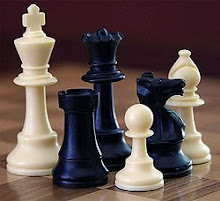I was reading a book on chess and came across a very interesting statement. The discussion was about ‘forking’, that is, attacking two pieces with a single piece. Such an attack means that one or the other of the attacked pieces can be saved and the other is captured. He stated, “In cases like this one you might compare a chess player to the author of a whodunit who starts his work by figuring out the solution which will come at the end of his book…the Knight’s forking check is the ‘solution’. Black’s task, once he sees this check is to search for the moves that make the check meaningful.” 1
It occurred to me that this same process is applicable to us in the church. First, it is a clear way to structure our spiritual life. What is our goal in our spiritual life? Every Christian should strive to become more Christlike disciples, to be closer to God. You know where you want to go, and where you are now, so how is that reasonably accomplished? Daily Bible reading and prayer, finding an accountability partner, finding and using your spiritual gifts are all excellent paths to this goal.
Secondly, we can apply this to other areas of our lives. If you want to achieve certain things in your life, then what do you need to do to get there? For instance, if you want to write a fiction novel, you need to sit down and start writing. If you want to get a Doctorate, then you need to work on your Master's degree. If you want to be a motorcycle mechanic, then you need to buy a 'beater' and enroll in a course or buy some books.
Finally, in the collective church we have goals as well. The high-falutin’ church language calls this “casting a vision” and there are entire seminars and college classes about it, but it’s really simple. The first question should be, “What is our vision for this church?” Where do we want to end up? What do we see this church being or doing in five years, or ten years? So many times we go along with no goal, and then wonder why we don’t seem to get anywhere. There’s an old story about a flight of military planes flying through overcast skies just after World War 2. Their navigational instruments were out when the controller radioed them and asked where they were. The pilot in the lead plane answered, “Well, I really don’t know, but we’re making good time!”.
If we want to be known as a “Praying Church”, do we have prayer meetings and activities? If we want to be known as “Friendly”, how do we support that goal? If we want to be known as the church that has its hands in the local community, how are we striving to get there?
Don't just dream about it and think God is going to drop things in your lap. Make a conscious choice to pray about where God wants you to go and what He wants you to do, then follow Him!
1 “How to be a winner at chess” by Fred Reinfeld: Fawcett, c1954, p65
.
The shortness of life
6 months ago
